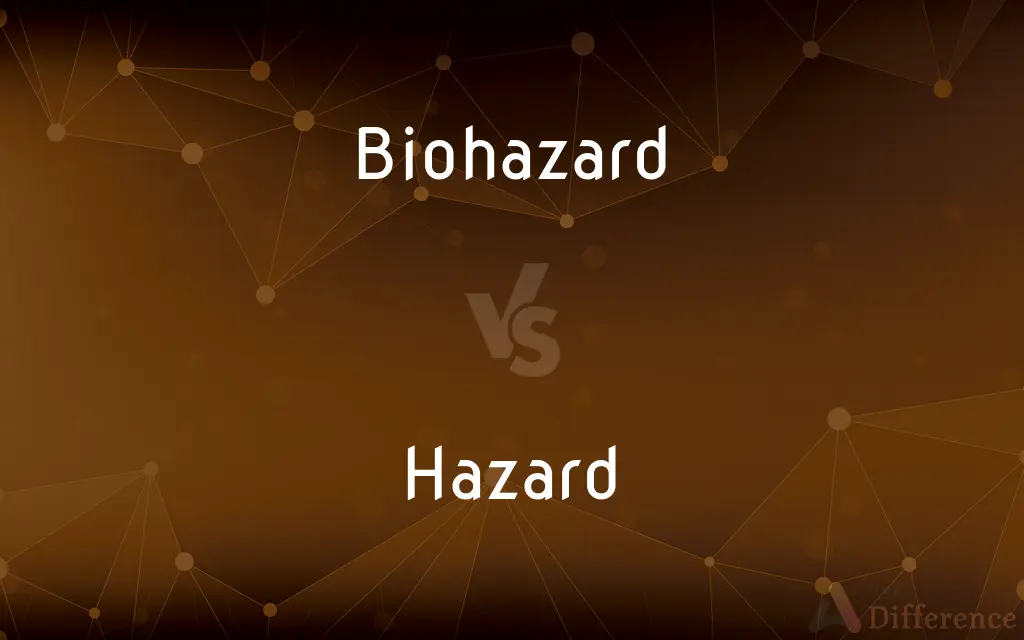Biohazard vs. Hazard — What's the Difference?
By Maham Liaqat & Fiza Rafique — Updated on May 6, 2024
A biohazard specifically refers to biological substances that pose a threat to living organisms, typically involving infectious agents, while a hazard encompasses a broader range of potential dangers to safety or health, not limited to biological sources.

Difference Between Biohazard and Hazard
Table of Contents
ADVERTISEMENT
Key Differences
A biohazard is defined as any biological agent or condition that can cause harm to humans, animals, or the environment, primarily focusing on pathogens like viruses, bacteria, and biological toxins. In contrast, a hazard is a more general term that includes any potential source of harm or adverse health effect on a person or property.
Biohazards are categorized specifically under biosafety levels ranging from 1 to 4, based on their severity and the protective measures required to handle them. On the other hand, hazards can be classified into various types such as physical, chemical, ergonomic, and psychosocial, depending on the nature of the risk they present.
Handling biohazards requires specific protocols to contain and neutralize the biological threat, such as using biosafety cabinets and personal protective equipment. Conversely, managing hazards might involve a broader range of safety measures, from engineering controls to administrative policies, tailored to the type of hazard.
While biohazards are strictly regulated by health and safety guidelines specific to biological safety, such as those from the Centers for Disease Control and Prevention (CDC) and the World Health Organization (WHO), general hazards are overseen by a wider array of regulations depending on the industry, including guidelines from entities like the Occupational Safety and Health Administration (OSHA).
The impact of biohazards is primarily concerned with infectious diseases and biological contamination, posing direct threats to health. In contrast, hazards could lead to various outcomes like physical injury, mental health issues, or even economic losses, covering a broader spectrum of potential impacts.
ADVERTISEMENT
Comparison Chart
Definition
Biological agents or conditions harmful to organisms
Any potential source of harm or adverse effect
Types/Categories
Classified by biosafety levels (1-4)
Physical, chemical, ergonomic, psychosocial, etc.
Safety Protocols
Specific containment and neutralization protocols
Varies widely, includes engineering and administrative controls
Regulatory Guidelines
CDC, WHO specific to biological safety
OSHA, various depending on the industry
Impact
Infectious diseases, biological contamination
Physical injury, mental health issues, economic losses
Compare with Definitions
Biohazard
A biological agent or condition that is harmful to human health.
The lab marked all containers of infectious samples with the biohazard symbol.
Hazard
A potential source of harm or adverse effect.
Slippery floors are a common hazard in the workplace.
Biohazard
Often associated with medical and research settings.
Biohazard waste disposal procedures are strictly enforced in hospitals.
Hazard
Mitigated through various safety measures.
They introduced new guidelines to manage ergonomic hazards in the office.
Biohazard
Requires high levels of containment.
Level 4 biohazards must be handled in a high-security biosafety laboratory.
Hazard
Can be physical, chemical, or psychological.
The factory addressed several hazards including noise and toxic chemicals.
Biohazard
Includes viruses, bacteria, and biological toxins.
The spill involved a biohazard that required immediate cleanup.
Hazard
Includes broader safety considerations.
Fire is a serious hazard that requires preventive measures.
Biohazard
Regulated by specific health standards.
Their biohazard protocols comply with the latest WHO guidelines.
Hazard
Subject to regulatory compliance.
The company updated its equipment to meet current hazard safety standards.
Biohazard
A biological agent, such as an infectious microorganism, or a condition that constitutes a threat to humans, especially in biological research or experimentation.
Hazard
A hazard is a potential source of harm. Substances, events, or circumstances can constitute hazards when their nature would allow them, even just theoretically, to cause damage to health, life, property, or any other interest of value.
Biohazard
The potential danger, risk, or harm from exposure to such an agent or condition.
Hazard
A chance of being injured or harmed
Space travel is full of hazards.
Biohazard
A biological hazard; a source of risk due to some biological factor such as bacteria or human waste.
Hazard
Risk or danger
A high degree of hazard.
Biohazard
Hazard to humans or the environment resulting from biological agents or conditions
Hazard
A possible source of danger
This room is a fire hazard.
Biohazard
Any bacterium or virus or toxin that could be used in biological warfare
Hazard
(Games) A game played with dice that is a forerunner of craps and was especially popular in England in the 1600s and 1700s.
Hazard
(Sports) An obstacle, such as a sand trap, found on a golf course.
Hazard
(Archaic) Chance or an accident.
Hazard
To expose to danger or risk.
Hazard
To venture (something)
Hazard a guess.
Hazard
To express at the risk of denial, criticism, or censure
"The wise young captain ... hazarded to the lieutenant-colonel that the enemy's infantry would probably soon attack the hill" (Stephen Crane).
Hazard
The chance of suffering harm; danger, peril, risk of loss.
He encountered the enemy at the hazard of his reputation and life.
Hazard
An obstacle or other feature which causes risk or danger; originally in sports, and now applied more generally.
The video game involves guiding a character on a skateboard past all kinds of hazards.
Hazard
(in driving a vehicle) An obstacle or other feature that presents a risk or danger that justifies the driver in taking action to avoid it.
Hazard
(golf) A sand or water obstacle on a golf course.
Hazard
(billiards) The act of potting a ball, whether the object ball (winning hazard) or the player's ball (losing hazard).
Hazard
(historical) A game of chance played with dice, usually for monetary stakes; popular mainly from 14th c. to 19th c.
Hazard
Chance.
Hazard
(obsolete) Anything that is hazarded or risked, such as a stake in gambling.
Hazard
(tennis) The side of the court into which the ball is served.
Hazard
(programming) A problem with the instruction pipeline in CPU microarchitectures when the next instruction cannot execute in the following clock cycle, potentially leading to incorrect results.
Hazard
To expose to chance; to take a risk.
Hazard
To risk (something); to venture, incur, or bring on.
I'll hazard a guess.
Hazard
A game of chance played with dice.
Hazard
The uncertain result of throwing a die; hence, a fortuitous event; chance; accident; casualty.
I will stand the hazard of the die.
Hazard
Risk; danger; peril; as, he encountered the enemy at the hazard of his reputation and life.
Men are led on from one stage of life to another in a condition of the utmost hazard.
Hazard
Holing a ball, whether the object ball (winning hazard) or the player's ball (losing hazard).
Hazard
Anything that is hazarded or risked, as the stakes in gaming.
Hazard
Any place into which the ball may not be safely played, such as bunkers, furze, water, sand, or other kind of bad ground.
Hazard
To expose to the operation of chance; to put in danger of loss or injury; to venture; to risk.
Men hazard nothing by a course of evangelical obedience.
He hazards his neck to the halter.
Hazard
To venture to incur, or bring on.
I hazarded the loss of whom I loved.
They hazard to cut their feet.
Hazard
To try the chance; to encounter risk or danger.
Hazard
A source of danger; a possibility of incurring loss or misfortune;
Drinking alcohol is a health hazard
Hazard
An unknown and unpredictable phenomenon that causes an event to result one way rather than another;
Bad luck caused his downfall
We ran into each other by pure chance
Hazard
An obstacle on a golf course
Hazard
Put forward, of a guess, in spite of possible refutation;
I am guessing that the price of real estate will rise again
I cannot pretend to say that you are wrong
Hazard
Put at risk;
I will stake my good reputation for this
Hazard
Take a risk in the hope of a favorable outcome;
When you buy these stocks you are gambling
Common Curiosities
How does a biohazard differ from a general hazard?
Biohazards specifically involve biological threats, whereas hazards can be of any nature causing potential harm.
Can a chemical be a biohazard?
Chemicals are typically not considered biohazards unless they contain biological agents.
What safety measures are used for biohazards?
Biohazards require specific containment protocols like biosafety cabinets and personal protective equipment.
Are biohazards more dangerous than other hazards?
The danger level depends on the specific agent and the exposure scenario; biohazards are particularly concerning for infection and contamination.
What are the legal implications of mishandling a biohazard?
Mishandling biohazards can lead to legal penalties, including fines and sanctions.
What are common examples of biohazards?
Common biohazards include bacteria, viruses, and medical waste.
How are hazards classified?
Hazards are classified based on their nature and the risk they pose.
How can biohazards be prevented?
Prevention involves strict adherence to safety protocols and proper training.
What is a biohazard?
A biohazard is any biological agent or condition that can harm humans, animals, or the environment.
What types of hazards are there?
Hazards can be physical, chemical, ergonomic, or psychosocial.
What should I do if I encounter a potential hazard?
Report it to the appropriate safety personnel and follow established protocols to mitigate risk.
What is the role of OSHA in hazard management?
OSHA sets and enforces standards to ensure workplace safety and health, covering various hazards.
Can hazards be completely eliminated?
While not all hazards can be eliminated, risks can be minimized through effective safety management.
What is a psychosocial hazard?
These are hazards that affect employees' psychological health within the workplace, like stress and harassment.
Is training required to handle biohazards?
Yes, specialized training is mandatory for handling different levels of biohazards.
Share Your Discovery

Previous Comparison
Number vs. Scalar
Next Comparison
Sequestrate vs. SequesterAuthor Spotlight
Written by
Maham LiaqatCo-written by
Fiza RafiqueFiza Rafique is a skilled content writer at AskDifference.com, where she meticulously refines and enhances written pieces. Drawing from her vast editorial expertise, Fiza ensures clarity, accuracy, and precision in every article. Passionate about language, she continually seeks to elevate the quality of content for readers worldwide.
















































